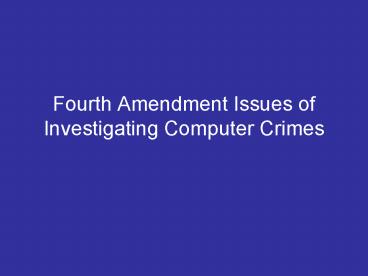Fourth Amendment Issues of Investigating Computer Crimes PowerPoint PPT Presentation
1 / 15
Title: Fourth Amendment Issues of Investigating Computer Crimes
1
Fourth Amendment Issues of Investigating Computer
Crimes
2
- Two main sources
- Fourth Amendment
- Privacy laws in the U.S. Code
- Title III
- ECPA
- Pen register and trap and trace devices statue
3
Search without a Warrant
- Does the person have a reasonable expectation of
privacy. - If not does the search fall under a specific
exception?
4
Katz Test
- Two Prongs
- 1.) Subjective component
- 2.) Objective component
5
Reasonable expectation of privacy and Electronic
Storage Devices
- Courts analogized electronic storage devices to
- a briefcase
- File cabinet
- Closed container
- Courts differ on whether each file is a closed
container or is the whole hard drive a closed
container.
6
- A person does not have a reasonable expectation
of privacy in what they expose to the public.
7
Expectation of Privacy and Third Parties
- May lose expectation of privacy when
- Take the computer to a repair shop.
- Mailing a disk to a friend.
- Transmitting information to a third party over
the internet.
8
Determining Third party Issues
- Two parts
- First part
- Possession of carrier during transmission to
intended recipient - Possession by recipient
- Usually have reasonable expectation of privacy
during transmission of data like a package going
through the U.S. mail system.
9
- Second part
- Once item has got to recipient did the sender
expect to maintain control over the item. - Safekeeping
- E-mail sent to chat room
- Lose control over time
- Mr. Poulsen
- Information given to third party
10
ECPA
- Transactional records
- articulable facts court order
- 18 U.S.C. 2703(d), 2711(3)
- Referred to as d order
- Basic subscriber information
- subpoena
11
Innovative Technology
- Kyllo v. United States, (2001)
- Is the technology in general public use?
- Does the technology have the ability to obtain
information about the interior of the home?
12
Exceptions to the Warrant Requirement
- Consent
- United States v. Matlock, (1974)
- Common authority
- Co-users
- Can consent to search even when other party
objects
13
- Was consent voluntary
- Age
- Education
- Intelligence
- Physical/mental conditions
- Person under arrest
- Miranda rights
14
- Spouses
- generally can consent
- absent affirmative showing no rights of access
- Parents
- Generally ok when under 18
- Three factors are weighed
- Suspects age
- Does suspect pay rent
- Affirmative steps taken to deny access to room or
private area
15
(No Transcript)

